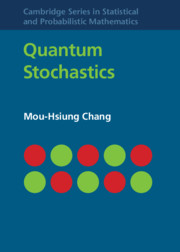Book contents
- Frontmatter
- Dedication
- Contents
- Preface
- Introduction and Summary
- 1 Operator Algebras and Topologies
- 2 Quantum Probability
- 3 Quantum Stochastic Calculus
- 4 Quantum Stochastic Differential Equations
- 5 Quantum Markov Semigroups
- 6 Minimal QDS
- 7 Quantum Markov Processes
- 8 Strong Quantum Markov Processes
- 9 Invariant Normal States
- 10 Recurrence and Transience
- 11 Ergodic Theory
- Bibliography
- Index
1 - Operator Algebras and Topologies
Published online by Cambridge University Press: 05 February 2015
- Frontmatter
- Dedication
- Contents
- Preface
- Introduction and Summary
- 1 Operator Algebras and Topologies
- 2 Quantum Probability
- 3 Quantum Stochastic Calculus
- 4 Quantum Stochastic Differential Equations
- 5 Quantum Markov Semigroups
- 6 Minimal QDS
- 7 Quantum Markov Processes
- 8 Strong Quantum Markov Processes
- 9 Invariant Normal States
- 10 Recurrence and Transience
- 11 Ergodic Theory
- Bibliography
- Index
Summary
This chapter serves as an overview of some of the basic building blocks for quantum probability, quantum Markov semigroups/processes, and their large time asymptotic behavior that are to follow.
We start out with a brief review of complex Hilbert spaces and their topological dual spaces together with the concepts of weak and strong convergence. The concepts of linear operators on complex Hilbert spaces are introduced. Special classes of bounded linear operators including self-adjoint, Hilbert-Schmidt, trace-class, compact and projection operators, operator-valued spectral measures, and the celebrated spectral representation theorem due originally to von Neumann (see von Neumann [vNeu55]) are discussed. We also define various concepts of operator topologies, such as norm-topology, strong topology, weak topology, σ-strong topology, σ-weak topology, and weak*-topology, on the space of bounded linear operators. Equivalence of some of these topologies under appropriate conditions are illustrated. This chapter also introduces the 2 major types of algebras, namely, the C*-algebra and von Neumann algebra of operators on a complex Hilbert space. These 2 different types of algebras are all to be denoted by A. However, the results will be stated with specification to which of the algebras is under consideration. Unless otherwise stated, it is assumed throughout the book that all algebras are unital; i.e., they contain the identity operator. These algebras, especially the von Neumann algebra, are important tools for describing quantum probability spaces and quantum systems. Many of the results presented in this chapter are stated in terms of C*-algebras in general without specifications to the von Neumann algebra. One of the important topology on Athat plays an important role in studying quantum Markov semi-groups or quantum Markov processes is the so called σ-weak continuity. Finally, we define representation of a C*-algebra and prepare the background material for describing Gelfand-Naimark-Segal construction for a representation of C*-algebra, which is described in detail.
- Type
- Chapter
- Information
- Quantum Stochastics , pp. 8 - 49Publisher: Cambridge University PressPrint publication year: 2015



